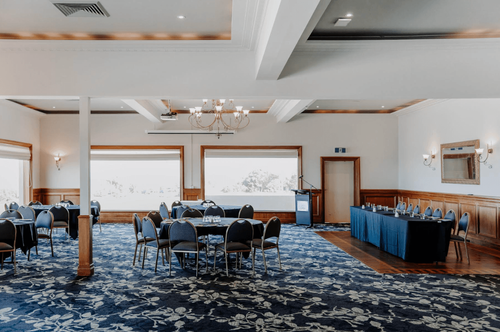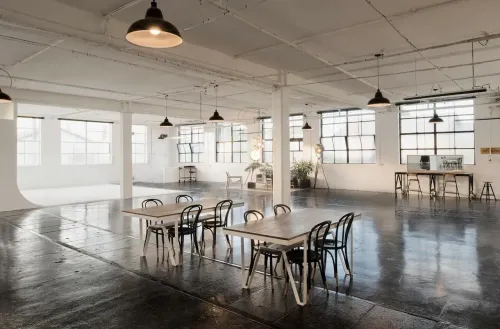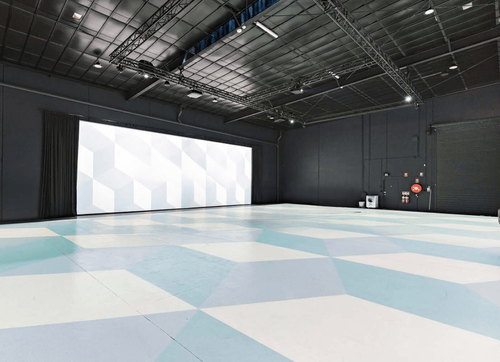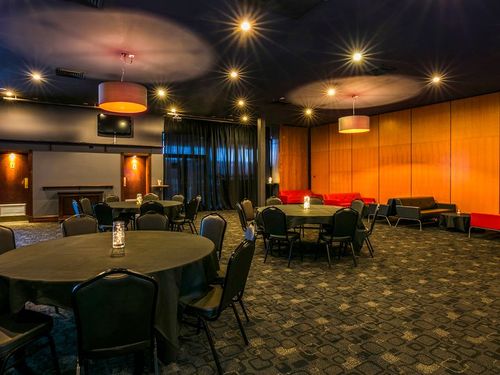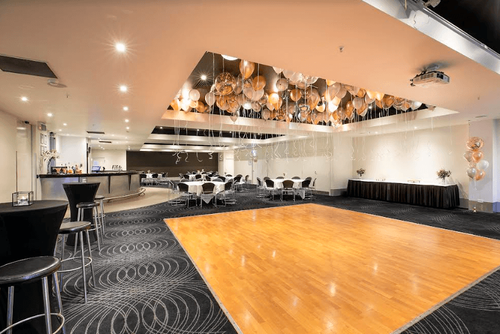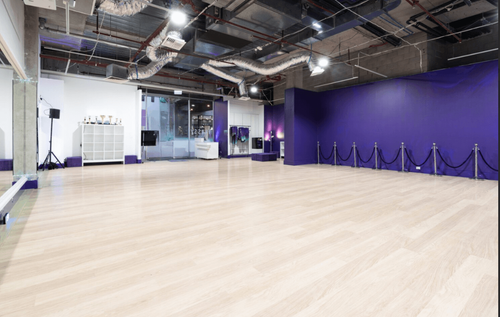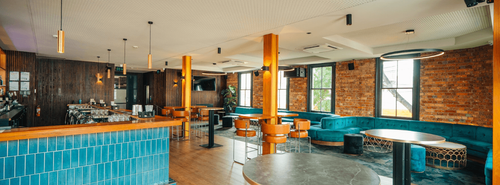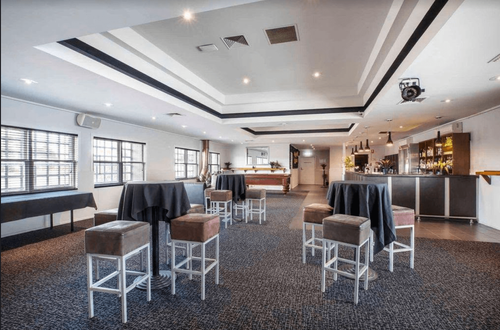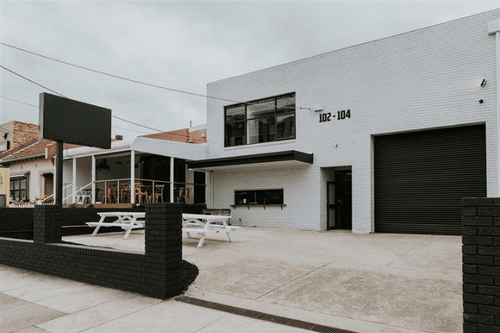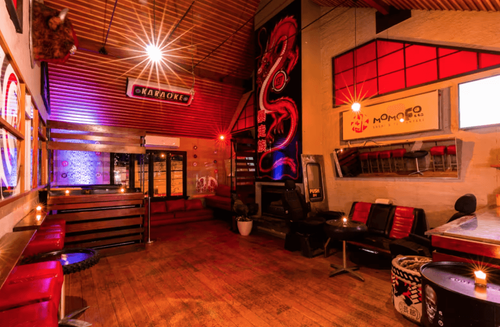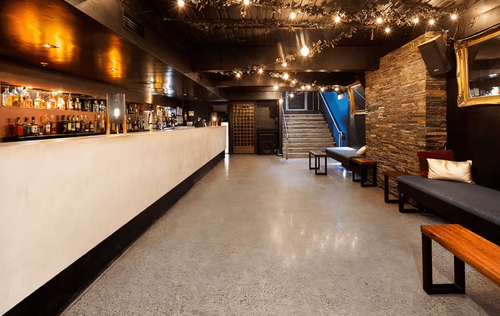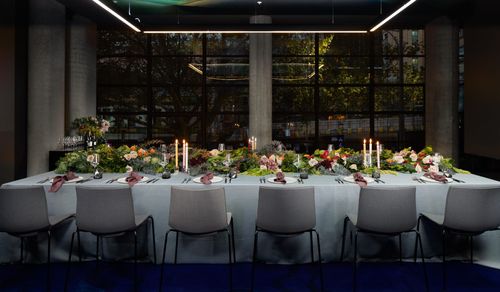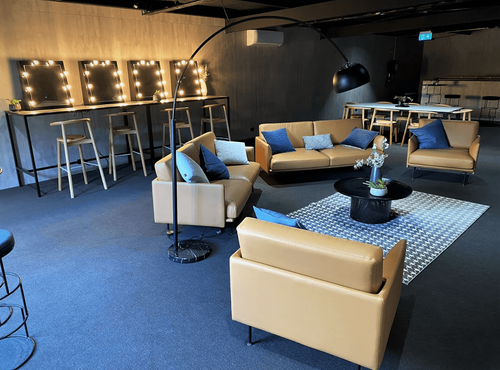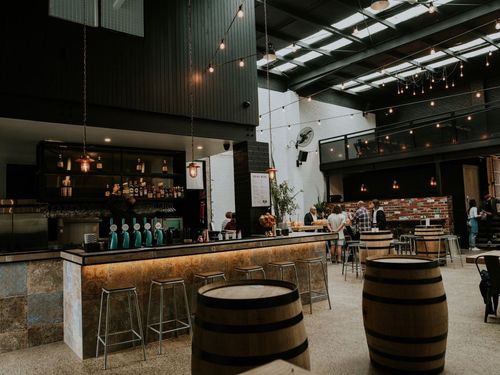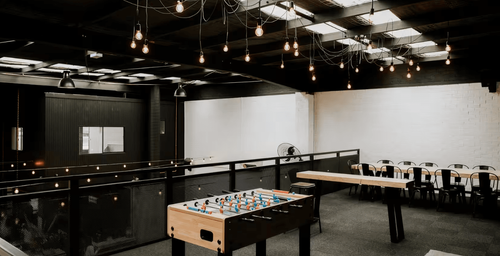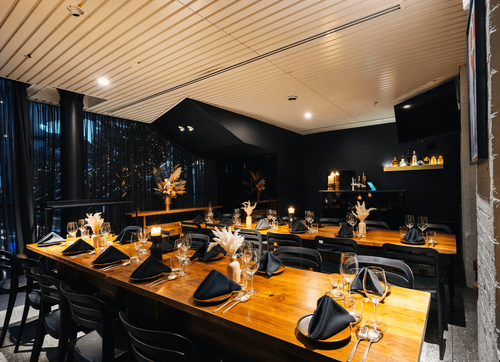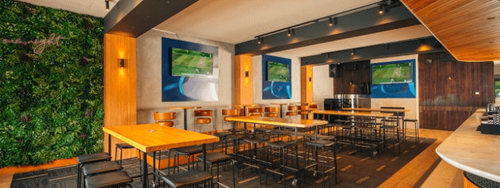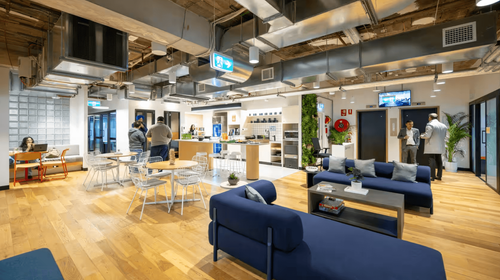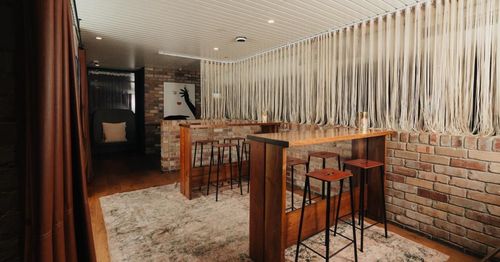Hire Workshop Rooms in Melbourne

Popular Workshop Venues in Melbourne
Find unique workshop spaces in Melbourne
See AllSpectacular Event Venue With Bay Views
Welcome to a spectacular venue, where your event dreams meet breathtaking Port Phillip Bay views! This versatile venue in Melbourne is perfect for any occasion, from networking mixers to gala dinners, offering a stylish and spacious setting. The space is just... Show More
Creative Event Venue With Abundant Natural Light
Looking for a venue that screams Melbourne chic? This dynamic event space in Melbourne is your ultimate blank canvas. With abundant natural light and a relaxed atmosphere, it's perfect for any creative vision you have in mind. Nestled in the vibrant Brunswick... Show More
Futuristic Event Space With State-of-the-Art AV
Experience a world where technology meets creativity in the heart of Melbourne. This central entertainment and presentation space dazzles with its cutting-edge audiovisual capabilities, ideal for events that leave a lasting impression. Nestled in the vibrant... Show More
Mid-Century Modern Venue for Dynamic Seminars and Conferences
This venue exemplifies mid-century modern architecture, featuring open spaces, clean lines, and a welcoming atmosphere. The dining area is framed by floor-to-ceiling windows, offering stunning views of a lush garden and bathing the space in natural light... Show More
Modern Ballroom With a Central Dancefloor for Dynamic Cocktail Parties
Step into this contemporary ballroom, where sleek modern design meets functional versatility. The venue's architectural style is a seamless blend of modern simplicity and functional elegance, featuring clean lines and open spaces that create an inviting yet... Show More
Vibrant Studio With Alluring Purple Accents for Creative Events
Explore the vibrant and versatile Purple Room, located in the heart of the bustling Docklands. This modern space is designed with a sleek, industrial style, featuring exposed ductwork, high ceilings, and polished wooden floors that add a touch of sophisticatio... Show More
Dynamic Event Venue with State-of-the-Art Video Wall
Explore an urban oasis of creativity and innovation at this contemporary Melbourne event space. With its double-height ceilings and jaw-dropping 9-panel video wall, the venue sets the stage for memorable corporate gatherings.Nestled in the vibrant heart of... Show More
Modern Bar With Teal Lounge and Exposed Brick for Casual Social Events
Are you looking for a stylish spot in Melbourne for your next event? This modern bar is where trendy meets cosy, perfect for any occasion, from casual meet-ups to intimate celebrations.The venue boasts a sleek wood-and-tile bar with a bold teal sofa in the... Show More
Elegant Venue With Gourmet Touches for Memorable Business Gatherings
Located conveniently in Mitcham, this venue seamlessly combines modern elegance with relaxed comfort, making it a standout choice for a variety of events. The space boasts a sleek, open-plan design characterized by high ceilings, large windows, and stylish... Show More
Industrial Chic Patio With Outdoor Space for Corporate and Social Events
Looking for a fresh, versatile space for your next event in the heart of Melbourne? This venue’s sleek, industrial design and modern amenities will make your event unforgettable.The architecture stands out with its clean, white brick exterior, featuring bold... Show More
Vibrant Asian-Inspired Venue With Bold Murals and Cozy Atmosphere for Events
Looking for a unique venue in Melbourne to host your next event? This vibrant space offers a dynamic blend of modern, Asian-inspired decor with a contemporary edge, perfect for a range of events.The architectural design features a striking combination of dark... Show More
Modern Industrial Venue With Rustic Stone Walls for Stylish Corporate Events
Looking for a venue that effortlessly combines style with function? This sleek, modern space in the heart of the city is perfect for a variety of events, from intimate gatherings to corporate functions and everything in between.The venue's striking design... Show More
Sophisticated Meeting Room With City Views
Located in the heart of Melbourne's business district, this sophisticated venue offers an elegant and modern setting for a variety of events. Whether hosting a meeting, conference, afterwork event, private dining, or workshop, this captivating space is... Show More
Urban Oasis With Industrial Chic
Step into an urban sanctuary where industrial charm meets contemporary flair. Located in Melbourne's vibrant industrial precinct, this venue offers a captivating blend of rustic aesthetics and modern amenities.Boasting a sprawling 6,000 sqm space, the space... Show More
Stylish Brewery Venue With Rustic Elegance for Memorable Events and Gatherings
Looking for a unique space that combines industrial chic with rustic charm? This brewery-inspired venue is the perfect backdrop for all kinds of events, from casual meet-ups to larger corporate gatherings and celebrations.With its soaring high ceilings and... Show More
Industrial Chic Venue With Playful Touches for Casual Gatherings and Events
Looking for a venue that combines relaxed sophistication with an industrial edge? This unique space, just a short stroll from the city's iconic landmarks, is ideal for your next event.The venue features a spacious, open-plan layout with modern and industrial... Show More
Dramatic Candlelit Dining Space With Dark Elegance and Luxe Wood Finishes
Looking for a venue that combines sophistication and intimacy? This dramatic dining space provides the perfect setting for elegant dinners and special occasions in a stylish, minimalist environment. The venue showcases contemporary design, with sleek wooden... Show More
Lush Modern Venue With Bold Greenery Wall for Social and Networking Events
Located in Melbourne's bustling scene, this venue offers a seamless blend of contemporary style and lush greenery, perfect for memorable gatherings. Inside, you'll find a chic, modern aesthetic featuring warm timber tones, sleek black metal finishes, and a... Show More
Modern Industrial Lounge for Networking Events and Informal Meetings
This dynamic venue fuses industrial and modernist architectural styles, creating an open, vibrant space that feels both professional and relaxed. High ceilings and exposed ductwork give a nod to its industrial roots, while the contemporary furnishings and... Show More
Eclectic Attic With Brick Walls and String Curtains for Private and Casual Dinners
Step into a modern and stylish lounge where urban chic meets comfort. Located in the heart of the city, this venue boasts exposed brick walls, a stunning wood slat ceiling, and a playful feature wall made of a curtain of white string, adding a whimsical yet... Show More
A Guide to Hosting Workshops in Melbourne
Melbourne is Australia's cultural capital, and there's no better place to soak up the city's undisputed artistic energy! From the eye-catching street art that transforms laneways into incredible outdoor galleries to the seemingly endless number of festivals celebrating everything from music to design, there's always something to spark your creativity! The city's unique blend of diverse communities and inspiring spaces makes it a dynamic hub for new ideas where creativity is celebrated. Whether you're an artist, a visionary, or just someone who loves to dream big, Melbourne is the perfect place for your creativity to flourish.
If you're looking to host a workshop in Melbourne, you're tapping into one of the most dynamic and inspiring cities in the world. Melbourne is the perfect backdrop for any workshop, thanks to its thriving arts scene, innovative mindset, and diverse cultural landscape.
Whether you want a workshop space in Melbourne to spark creativity, foster collaboration or dive deep into a specialised topic, you'll find that this city has a venue to match your vision.
From stylish inner-city spaces to serene locations that encourage reflection and focus, Melbourne provides endless possibilities to create an engaging and memorable workshop experience. Let's explore how you can make the most of what this incredible city offers for your next workshop.
1) What Kind of Workshop Venues Can You Find in Melbourne?
With its incredible culture and creative spirit, Melbourne has an inspiring range of workshop spaces catering to any need or imagination. Whether you're planning a hands-on creative workshop or a more formal corporate training session, this city has the perfect space to spark innovation and collaboration.
1. Artistic studios: If you're looking to unleash your team's inner artist, Melbourne's artistic studios are the perfect workshop room. These spaces are often decorated with inspiring murals, bright colours, and plenty of natural light to keep those creative juices flowing.
Think of places with open layouts, easily ready, and a relaxed vibe that encourages free thinking. They're ideal for creative workshops where participants need to get their creativity flowing with fun activities.
2. Modern co-working spaces: Ideal for those looking for a more contemporary feel, Melbourne's co-working spaces offer sleek, modern environments with workshop facilities that are perfect for tech workshops, startup incubators, or innovation boot camps.
These workshop spaces usually have high-speed WiFi, ergonomic furniture, and all the necessary tech. The design is often minimalist but stylish, with a mix of open areas for collaboration and private nooks for focused work. This venue is excellent for fostering a sense of community and teamwork among participants.
3. Historic buildings: Melbourne's landmark buildings are pretty special. They offer a unique blend of old-world elegance and modern amenities. Your workshop could be held in a grand ballroom with high ceilings, ornate mouldings, and vintage furnishings while you enjoy the latest AV technology. These workshop event spaces are perfect for workshops that need a more formal, prestigious setting, whether it's a leadership seminar or a strategy session.
4. Eco-friendly workshop venues: Melbourne prides itself on sustainability, and it has plenty of eco-friendly workshop locations. These spaces often feature green walls, solar panels, and recycled materials, creating an environment that's not only good for the planet but also conducive to fresh, green ideas.
5. Quirky and unconventional workshop facilities: If you're looking for something unique, Melbourne's quirky and unconventional workshop facilities have you covered. Think converted warehouses with exposed brick walls, industrial lighting and quirky decor that add a touch of personality to any workshop. These spaces are ideal for interactive workshops that thrive on creativity and out-of-the-box thinking — whether it's a brainstorming session, design sprint or team-building exercise.
2) Planning the Budget for Booking a Workshop Space
Are you planning a workshop in Melbourne and worried about costs? Don't worry—whether you're organising a small brainstorming session or a large corporate training event, Melbourne offers cool workshop rooms to suit any budget.
With a bit of strategic planning, you can find a fantastic workshop studio without breaking the bank. Here's a detailed guide to help you estimate costs and make informed decisions for your event.
- Small to medium-sized workshop locations: Small to medium-sized workshop rooms are your best bet for more intimate meetings or focused sessions. These cosy spaces typically cost between €90 and €250 per hour in Melbourne. They're ideal for start-ups, creative brainstorming or personal development workshops, allowing you to bring your ideas to life without breaking the bank.
- Medium to large workshop rooms: If you're planning for a larger audience, medium to large workshop rooms can accommodate up to 100 people. These rooms typically cost between €250 and €600 per hour and are perfect for corporate training, product launches or workshops that require more space.
- Specialised workshop spaces: Specialised venues are the way to go when your workshop needs a unique setting. These spaces, from high-tech labs to creative art studios, are designed to meet specific needs. In Melbourne, prices for specialised workshop spaces vary widely, from around €150 to €900 per hour, depending on the workshop facilities and equipment provided.
Additional costs to consider:
- Catering: No workshop is complete without refreshments. Catering in Melbourne can range from simple snacks and coffee to a full gourmet meal. Depending on the menu, expect to spend between $10 and $40 per person.
- Staff & service: To ensure your workshop runs smoothly, you may need extra help. The cost of hiring staff for set-up, registration or assistance can range from €80 to €250 per day, depending on the level of expertise and number of staff required.
- AV equipment rental: Whether you need a projector, microphone or sound system, having the right AV equipment is crucial. In Melbourne, equipment hire costs range from €40 to €150.
- Marketing and promotion: Effective promotion of your workshop is key! Budgeting between €150 and €400 for social media ads, flyers or email campaigns is smart.
- Season and demand: Timing is everything! Prices for venues and services may increase during peak seasons or periods of high demand. To avoid higher costs, it's best to plan ahead and book early.
3) The Top Workshop Locations in Melbourne
Melbourne may be known for its iconic laneways and coffee culture, but it's the neighbourhoods that give the city its unique charm! Each area brings something different to the table, making it hard to choose just one to fall in love with. So we've put together a list of the best areas to hold a workshop in this vibrant, ever-evolving city.
1. Central Business District (CBD): The CBD is not only the city's financial and business centre but also a cultural epicentre with easy access to a variety of public transport options, quality hotels, and a range of modern, well-equipped venues.
The skyline is characterised by iconic skyscrapers and historic buildings, making it ideal for inspiring corporate teams and creative minds. The energy of the CBD ensures that workshops here have a dynamic and engaging atmosphere.
2. Southbank: Another prime location in Melbourne, Southbank is known for its stunning riverside views and luxurious ambience. This area is perfect for workshop sessions that require an element of sophistication.
A stone's throw from the CBD, Southbank offers a mix of fine dining, cultural landmarks such as the National Gallery of Victoria and stylish workshop venues. Its proximity to the arts precinct adds a cultural flair, while the scenic Yarra River provides a soothing backdrop, making it an excellent location for workshops that combine productivity with a touch of leisure.
3. Fitzroy: For those looking for an unconventional and creative environment, Fitzroy is the place to be. This area is the core of Melbourne's alternative scene, known for its colourful street art, eclectic cafes, and art galleries.
Fitzroy's bohemian vibe makes it an inspiring place for collaborative workshop spaces that thrive on innovation. Venues here are as diverse as the area itself. Fitzroy's relaxed and community-focused environment is perfect for interactive, hands-on workshops where creativity is the focus.
4. South Melbourne: A charming mix of old and new, South Melbourne is a versatile option for a variety of workshops. Just outside the CBD, this area is known for its historic architecture, tree-lined streets, and the famous South Melbourne Market.
Workshop venues in the area range from beautifully restored heritage buildings to contemporary studios, providing an ideal setting for cool workshop rooms that require both focus and inspiration.
The area's mix of residential and commercial spaces gives it a relaxed yet professional feel, making it suitable for everything from corporate training to creative brainstorming.
5. Richmond: A dynamic neighbourhood that perfectly balances modernity with a laid-back vibe, Richmond is known for its industrial roots and is now a hotspot for trendy workshop facilities that are both stylish and functional.
This area is ideal for creative workshops that need a flexible space. The neighbourhood's eclectic mix of old and new and its closeness to the CBD make it a convenient yet unique location for any type of workshop.
The booming local scene of cafes, restaurants, and boutiques adds energy and inspiration to workshops held here.
4) Catering Ideas for Interactive Workshops
It's important to keep workshop participants energised, and the right food can make a big difference. But forget about the usual options –- Melbourne, with its reputation as a culinary hotspot, has so much more to offer. From creative menus to unique flavours, here are some top event caterers that will make your workshop experience one to remember.
- Blakes Feast: This catering company is all about taking ordinary food and making it extraordinary. They use fresh, local ingredients to create menus that not only taste great but also cater to a variety of dietary needs. Their attention to detail and stylish presentation make them a top choice for workshop catering in Melbourne.
- The Catering Company: A Melbourne favourite for years, The Catering Company offers a wide range of gourmet options perfect for workshops. From vibrant salads to hearty sandwiches and hot dishes, their menu is designed to keep participants energised and engaged.
- Peter Rowland Catering: A legend in Melbourne's catering scene, Peter Rowland Catering is renowned for its creative approach to food. Whether you need a quick breakfast spread or a full lunch, they've got you covered. Their flexible, bespoke menus make them a perfect fit for any workshop.
- Ed Dixon Food Design: Ed Dixon Food Design brings a touch of flair to workshop catering. Their menus are carefully crafted to include a mix of flavours that are as exciting as they are satisfying. They also focus on sustainability, using local ingredients that are good for your palate and the planet.
- Bursaria Fine Foods: This local event caterer brings a fresh, seasonal touch to workshop catering. Located in the historic Abbotsford Convent, they offer a range of delicious options that are beautifully presented and full of flavour. Whether you're looking for a light snack or a more substantial meal, they deliver with style.
5) Tips to Invigorate Your Workshop Session
Here’s a little bonus reading before you hire a workshop space in Melbourne. These tips are going to make your Melbourne workshop one of a kind. When you create an environment that's dynamic and engaging, you'll achieve your goals and leave your team feeling inspired and ready to take on the world!
- Pick a cool workshop venue: Melbourne has many unique spots beyond the standard boardroom. Think spaces with natural light, funky decor, or a rooftop garden. The right setting can get your team thinking and keep them engaged. Plus, a cool venue makes everything feel a little more special.
- Mix up the agenda: Ditch the traditional workshop format! Break up the day with a mix of interactive activities, group discussions, and practical exercises. Incorporate exercise by organising a short walk outside or a team-building activity that gets everyone on their feet. A change of pace keeps energy levels high and minds sharp.
- Fuel the fun with local flavours: Keep your team energised with delicious snacks and meals that highlight Melbourne's fantastic food scene. Opt for local coffee brews, artisan pastries or a lunch spread that showcases Melbourne's multicultural cuisine. Great food is always a crowd-pleaser and adds an element of enjoyment to your day.
- Integrate creative breaks: Give your team a mental reset with creative breaks. Set up a mini art station, have a quick brainstorming session in pairs or even invite a local artist to lead a short workshop. These little bursts of creativity can re-energise your team and inspire fresh ideas.
- End with a bang: Wrap up your workshop with a powerful closing activity. Whether it's a fun group photo, a quick awards ceremony or a toast to the day's successes, ending on a high note ensures everyone leaves with positive vibes and a sense of achievement.
Wrapping Up
We hope this guide to hosting a workshop in Melbourne has given you some great tips for planning a successful event in the city.
But there's still so much more to discover in Melbourne. Our local team is here to help you explore all that the city has to offer, so your event is nothing short of exceptional — so get in touch!

FAQs about Melbourne Workshop Spaces
Melbourne is pretty much the coffee capital of Australia, so it's no surprise that lots of workshop rooms here offer coffee and tea facilities. You might even get to try some of the city's best-known local brews! However, it's always a good idea to check with the venue beforehand to ensure they have exactly what you need.
There are several effective ways to sell tickets for your workshop in Melbourne. A popular choice is Eventbrite, which offers a user-friendly interface for creating and managing events. Another excellent option is Humanitix, an Australian platform that uses its profits to support educational charities.
TryBooking is also a local favourite in Australia. It offers flexible ticketing options and is known for its easy set-up process. The platform is particularly useful for community events and smaller workshops, offering features tailored to local needs.
Finally, Ticketebo is a convenient choice for those who prefer an Australian-based solution with competitive fees. It offers a range of ticketing options and promotional tools, making it a versatile choice for managing and selling tickets for your Melbourne workshop.
This would differ from workshop room to workshop room, but overall, workshop rooms in Melbourne typically offer flexible layouts to accommodate various setups, modern AV equipment like projectors and microphones, and essential tools such as whiteboards and flip charts. Comfortable seating ensures that participants can engage fully, while high-speed internet access and refreshments often add convenience to the experience.
However, contacting the venue is always best to learn more about its amenities.
Make your workshop more inclusive by reflecting on Australia's multicultural landscape. Start with a welcoming segment that acknowledges and celebrates different cultural backgrounds. Use diverse case studies, examples, and speakers to provide varied viewpoints. Offer breakout sessions or group discussions where participants can share their own cultural experiences and insights. Use materials and approaches that are culturally inclusive to ensure that all attendees feel represented and valued.
